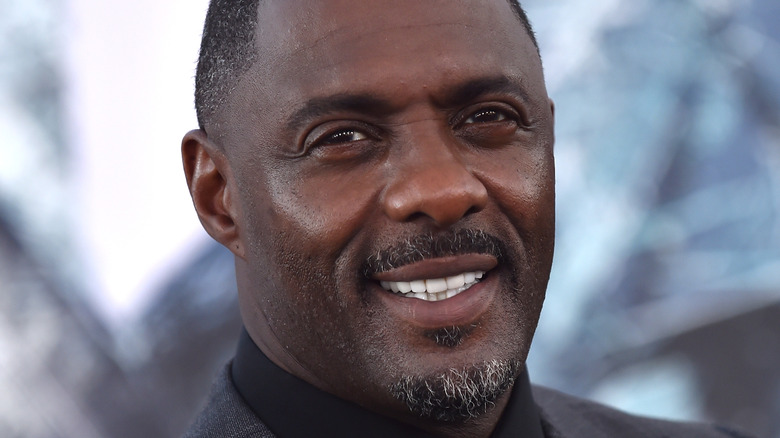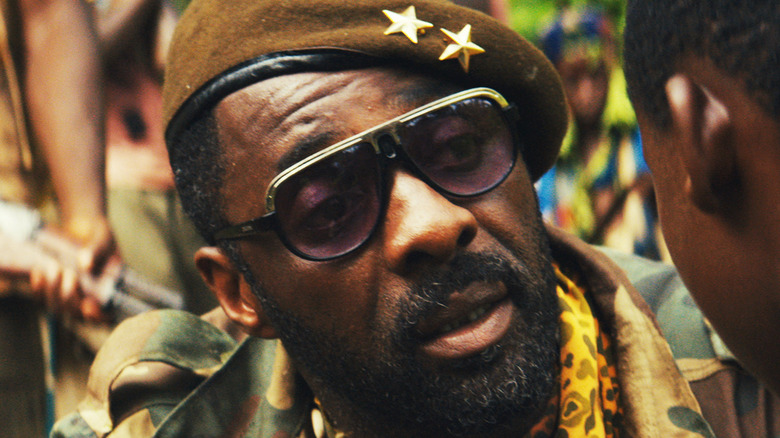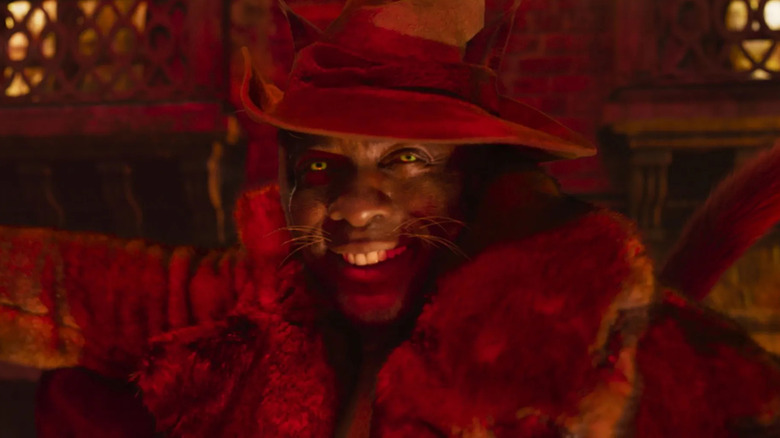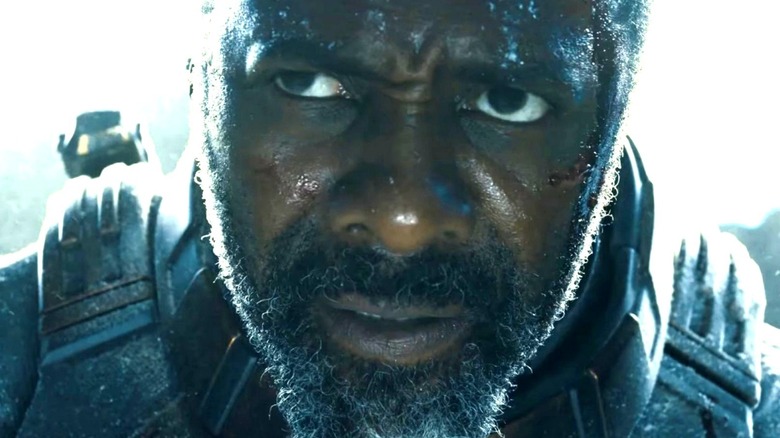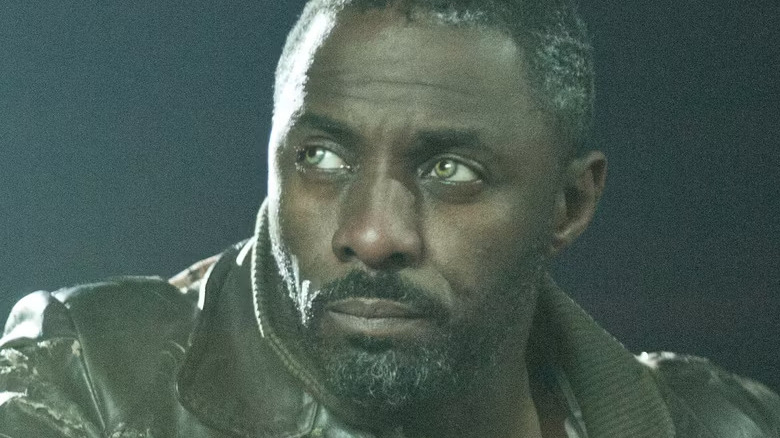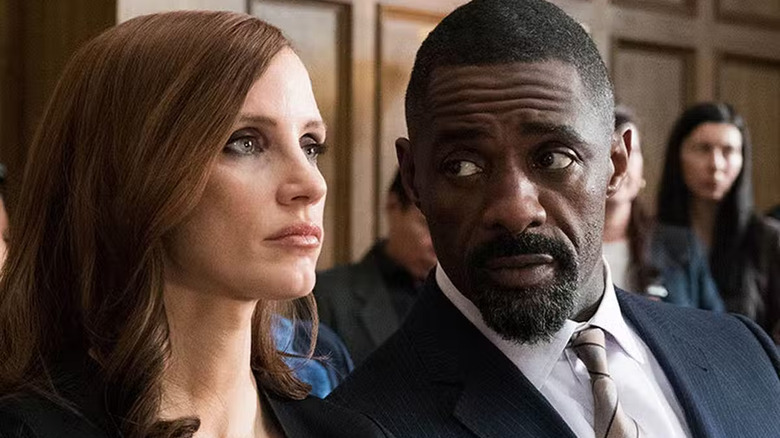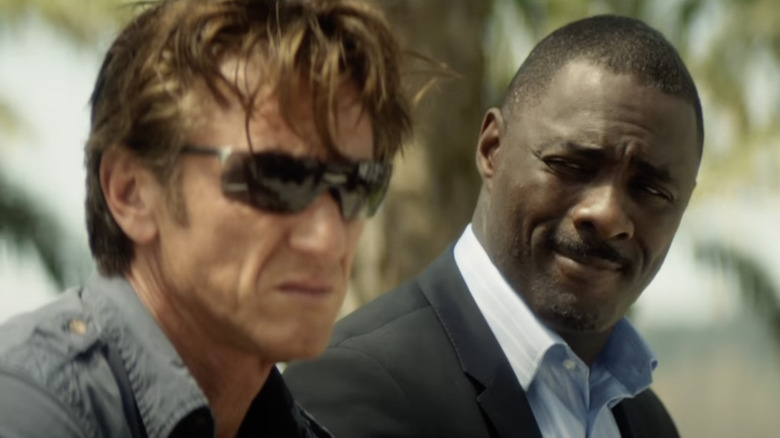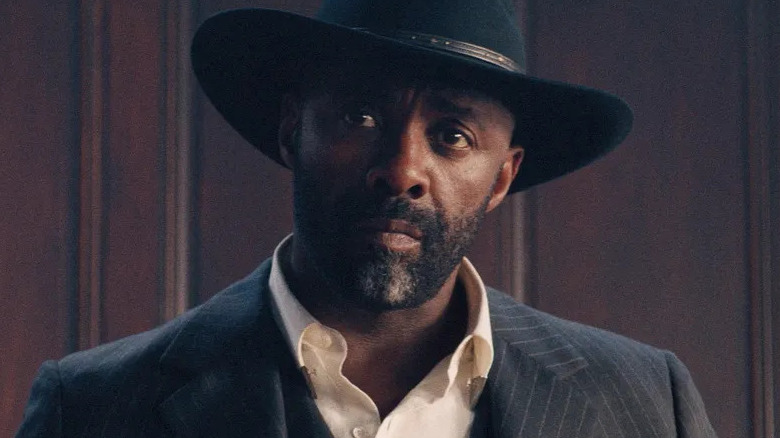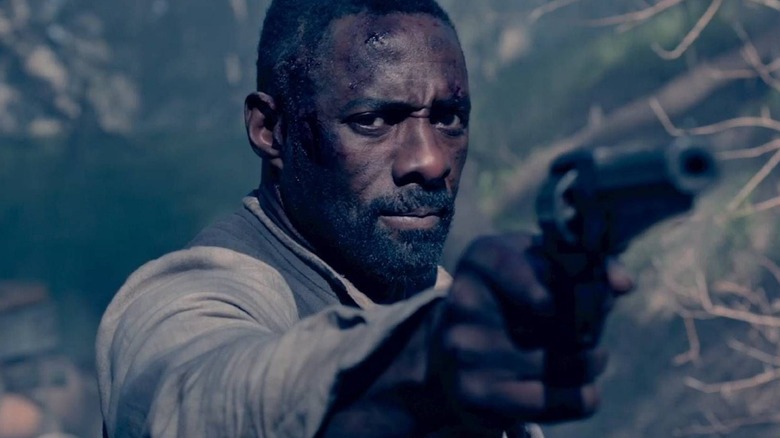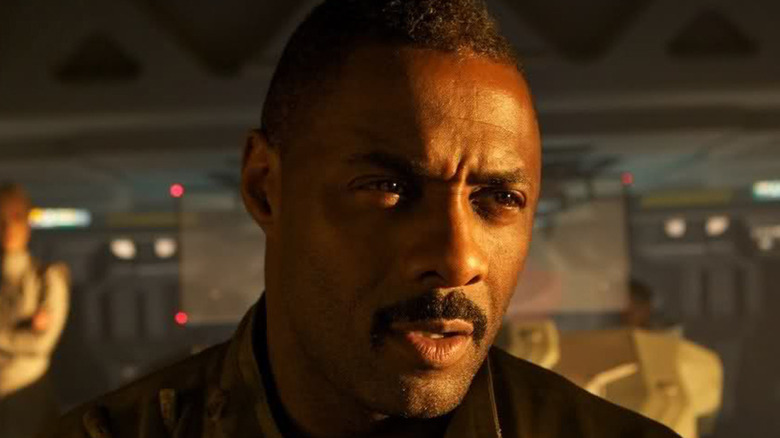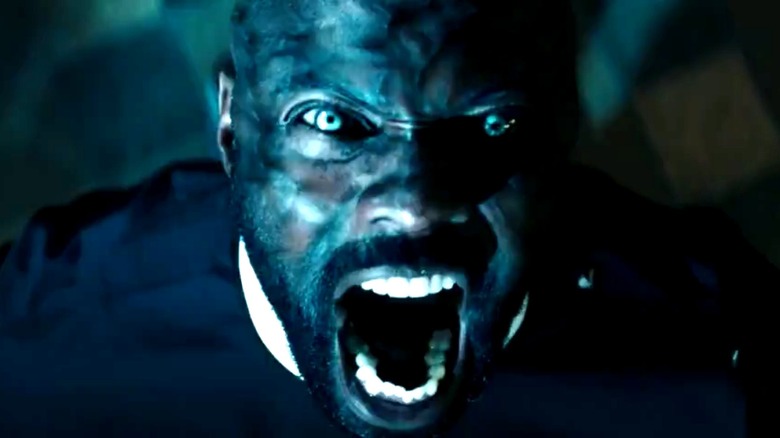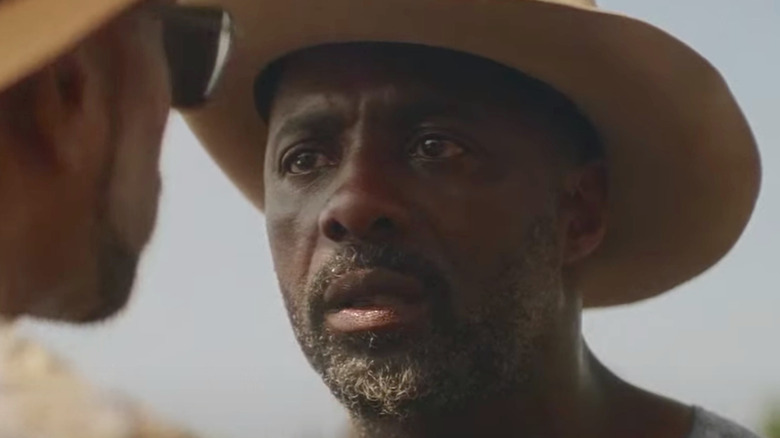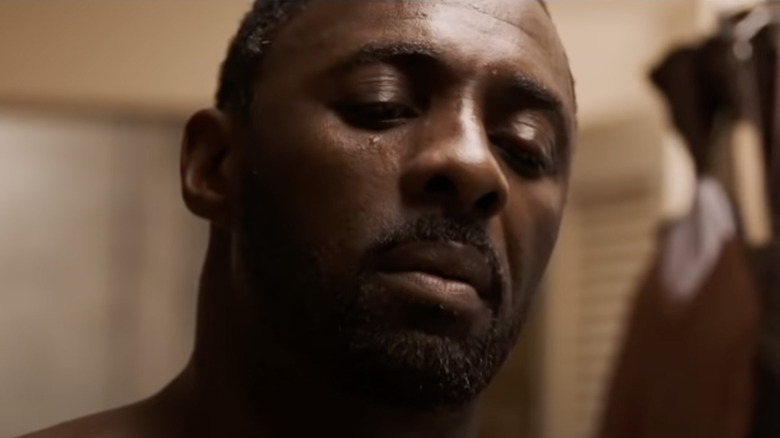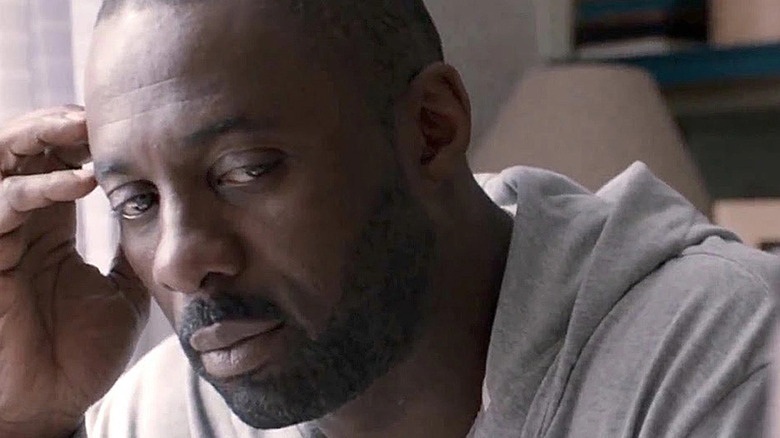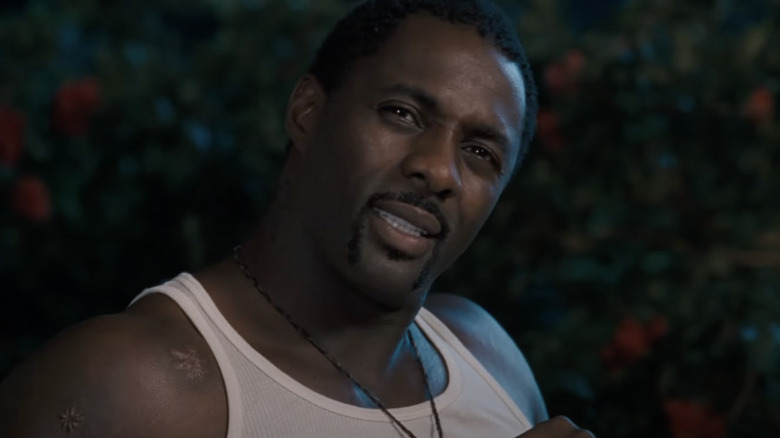Idris Elba's 7 Best And 7 Worst Movies Ranked
If you're familiar with Idris Elba, then chances are you love his screen presence. It might be for his rich basso voice that appears in animated mega-hits like "Zootopia" and "The Jungle Book." It might be for his unnatural suaveness, which has kept him locked into a will-they-won't-they relationship with the role of James Bond for film after film. It might also be for his frequent roles in major blockbusters, such as his six stints as Thor's best friend Heimdall in the Marvel movies. Or, perhaps most likely, it could just be because Elba is an exceptionally skilled dramatic actor whose filmography is packed with movies that fans and critics alike have adored.
It isn't all sun and rainbow bridges in the British actor's career, however. Like any actor, no matter how talented they may be, Elba has attached his name to some, to put it diplomatically, less than successful projects. No matter how much he tends to personally excel, sometimes the movie elements beside him haven't quite risen up to meet him in quality or acclaim. In order to help you separate the cinematic beauties from the (sometimes literal) beasts in Idris Elba's filmography, here's a look at the seven best and seven worst movies ranked.
Best: Beasts of No Nation
Though it features one of Idris Elba's best performances yet, and despite positively glowing reviews almost across the board, there is a solid statistical chance that you've never heard of "Beasts of No Nation." That's because the movie's release was plagued by controversy, ensuring that almost no one was able to see it in theaters.
The film was planned for a 2015 release, appearing both in theaters and streaming on Netflix at the same time. At that point, the generally-held convention in distribution was for theaters to have full screening rights for 90 days before media like streaming and home video could begin their work. Because of the film's decision to stream on day one, four of the biggest theater chains chose not to show it, turning a worldwide release into an extremely limited one — it made less than $100,000 worldwide.
In hindsight, the biggest obstacle "Beasts of No Nation" had to face was timing. Had it come out perhaps five years later, when the pandemic forced distributors to be flexible with how films were shown, it may have fared very differently in terms of box office success. Alas, it came out in 2015, and so remains a relatively obscure — but remarkably moving — hidden gem on Netflix.
Worst: Cats
If there's one movie on this list, whether best or worst, whose rank should surprise no one, it's "Cats." From its first trailer, the feline film was lampooned across the internet, mainly due to its nightmare-inducing, uncanny-valley characters — not quite cats, not quite people, not even quite a mix of the two, just odd, shiny computer-generated monsters. Though many films defy expectations and prove the early haters wrong, "Cats" was not one of them. Despite coming with a built-in audience of fans of the original Andrew Lloyd Webber musical, neither they nor the critics were fond of the finished product, a cinematic experience more akin to torture than to entertainment.
In addition to its abysmal reviews, the train wreck that was "Cats" even failed to entice enough rubberneckers to make back its production budget, and ended up losing millions — largely claimed to be related to its subpar, inadvertently scary special effects. Idris Elba's role in the fiasco was as the villainous Macavity, a truly terrifying foe in the musical who in the movie, felt (forgive us) neutered. Even with Taylor Swift explaining how formidable he is for over five minutes, Macavity never comes across as anything but an ineffectual (forgive us again) scaredy cat.
Best: The Suicide Squad
After David Ayer's 2016 "Suicide Squad" failed to do... much of anything but fail, the previously promising franchise seemed as doomed to death as its titular cannon fodder villains. Luckily for its fans, the series eventually found salvation through a perfect storm of creative shakeups (as well as the wise decision to keep the first movie's sole positive aspect, Margot Robbie as Harley Quinn). With James Gunn taking the reins, and with the addition of such comedic and dramatic treasures as David Dastmalchian, John Cena, and Elba (of course), the 2021 relaunch "Suicide Squad" ended up a fun, freakish, fantastic movie.
In the relaunch, Idris Elba plays Bloodsport: a master assassin, flawed but loving father, and in every way a blatant attempt to replace Will Smith's Deadshot. And though Smith performed respectably in his role, especially given the shoddy project around him, he didn't manage to stick the landing as de facto team leader (and likable protagonist) nearly as well as Elba. In the midst of the movie's ample chaos, carnage, and comedy, Elba keep the "Suicide Squad" grounded and human. The movie has already generated its own spin-off series, "Peacemaker," and Idris Elba's Bloodsport may potentially be in line for the same treatment.
Worst: Ghost Rider: Spirit of Vengeance
You would be forgiven for forgetting that Idris Elba is a member of the Marvel movie two-timers' club. Unlike Chris Evans, whose dual roles — the Human Torch and Captain America — were as high profile as can be, Elba's two roles are almost the exact opposite. Although the Norse sentinel Heimdall is certainly famous enough, Elba's turn as the exposition-spewing monk Moreau in "Ghost Rider: Spirit of Vengeance" is an understandably forgettable affair.
Oddly enough, both characters have almost identical golden contacts over Elba's natural brown eyes, but that is where the similarities end. Unlike Heimdall, whose valor is guarded by his grim stoicism, Moreau's character is decidedly more superficial, and so even Elba's exceptional skill isn't enough to make him memorable. Moreau is a monk whose most notable features are his alcoholism and untraceable accent. Lucky for Elba, "Ghost Rider: Spirit of Vengeance" was an all-around flop among critics and fans, so any less-than-perfect portrayal on his part is largely confined to the dustbin of Marvel cinematic history — an average effort from Elba is hardly a matter of concern in a movie which by critic consensus is "plain trash."
Best: Molly's Game
The 2017 biographical drama "Molly's Game" was very well-received by both audience and reviewers, was nominated for the Academy Award for Best Adapted Screenplay, and Idris Elba is outstanding in it. Despite all that, the movie may or may not be for the average Elba fan, or the average fan of any type — it all depends on your relationship to Aaron Sorkin and his work.
Sorkin, the widely-acclaimed and repeatedly-awarded screenwriter and director, is about as good as ever in his creation and execution of "Molly's Game," but he's also about as himself as ever. Like every Sorkin project to date, "Molly's Game" is unusually clever, fast-moving, layered, and stuffed with a writer's life's worth of literary and cinematic references — but "Molly's Game" is all of these stylistic quirks cranked up to the max. If that suits you, then you'll enjoy "Molly's Game" and Elba's masterful acting therein.
Elba plays Charlie Jaffey, the lawyer who represents Molly Bloom in court. Jaffey is both the movie's moral compass and its hero, as he is the only one in Bloom's life to see through her crimes to the genuine goodness beneath. Elba is fantastic in bringing the character to life, as evidenced in scenes like the "drop the charges" speech.
Worst: The Gunman
It's not often that a movie with Sean Penn in a starring role is met with almost unanimous scorn from critics. The two-time Academy Award winner for best actor is generally considered one of the best actors of his era, and more often than not, an earnest Penn performance alone is enough to give a movie legs. But, as you may have guessed from its place in the "worst" category, "The Gunman" is a rare exception to Penn's Law, and even the added dramatic might of costars Javier Bardem and Idris Elba couldn't save it from bombing.
The movie, another in a long line of "retired hitman forced back into action by the ghosts of his sins" plots, failed to connect with audiences (unlike the ever-expanding "John Wick" franchise), which they voiced not just with their reviews but also their wallets — "The Gunman" failed to recoup much more than half its production budget. If critical consensus is to be believed, then the movie's main issue lies in its strategy of focusing on filming in beautiful locations instead of telling an original story. Having seen the movie, we're prepared to agree with the experts.
Best: The Harder They Fall
Idris Elba plays one heck of a villain. Despite all of his starring roles as confident, charismatic protagonists, Elba just seems made for the role of antagonist. It may be due to his imposing height and frame, his heavy brows and piercing eyes, his deep full voice, or all of the above, but no matter why, Elba makes one compelling and often terrifying bad guy. To see the proof yourself (and in a fun, fabulous movie), look no further than the Netflix revenge Western "The Harder They Fall."
The plot of "The Harder They Fall" could not be any more cookie-cutter for a Western: The bad guy kills the good guy's family and sets the good guy on a long, shootout-filled quest for revenge. However, everything that director Jeymes Samuel builds off of that skeleton is fresh and entertaining. The cast is almost entirely Black, the music is almost entirely by Black artists, and even the long-standing Western trope of white hats and black hats is subverted by its black-hatted hero, Nat Love. The film is an exemplary Western, not just for its cinematic experience, but also for the way in which it helps undo the whitewashing of the old West.
Worst: The Dark Tower
Adapting beloved book series is always a gamble, as is adapting dense fantasy sagas with expansive histories and lore. Stephen King's "The Dark Tower" series is both, and when Sony decided to take those twin gambles in 2017 by adapting elements from the series into a big-budget action film, they lost big. Despite a passable performance at the box office, few found the movie anything but a rushed, boring disservice to King's work. Even King himself, though he praised the efforts of the movie's writers and directors, was forced to admit that the adaptation was a failure. Idris Elba fans, however, have at least one reason to celebrate: The one aspect of the movie that actually worked was Elba's portrayal of the Gunslinger himself, Roland Deschain.
In review after review, Elba's name comes up as one of the movie's only bright spots, if not the only one at all. Time, which found the movie unimaginative and boring, still included that "Elba, elegant and understated, makes even the goofiest lines of dialogue believable." Likewise, Entertainment Weekly's review notes that "Elba makes that dull content sound stylish." But perhaps most direct of all is the headline to Deadline's review: "Stephen King Fans Can Be Thankful Idris Elba Is Here To Save The World — And The Movie."
Best: Prometheus
Don't get us wrong: "Prometheus” is not a perfect movie. The "Alien" prequel has a long list of flaws, the most famous of which likely being the stupidity of its characters. The crew of the titular spaceship Prometheus is so idiotic that they redefined a fundamental screenwriting trope — what was once predominantly known as One-Dimensional Thinking is now largely referred to as "The Prometheus School of Running Away From Things" (a reference to an exceptionally baffling action sequence), as coined by the YouTube comedy channel CinemaSins. But the Ridley Scott-directed sci-fi film also has a number of high points, and Idris Elba is one of them.
In general, the performances in "Prometheus" were praised by reviewers and audiences, most notably stars Elizabeth Shaw, Michael Fassbender, Charlize Theron, Guy Pierce, and Elba. Their skill, alongside the movie's visual spectacle, heavy atmosphere, and existential horror, make "Prometheus" more good than bad. As incompetent as its characters are, the movie itself is well-wrought and manages to add a lot of depth to a franchise that could so easily fall back on its man-versus-monster core.
Worst: The Unborn
There are a lot of things about the 2009 supernatural horror "The Unborn" that make the film seem like it should be a worthwhile watch. The concept is a cool one — a young woman investigates an apparent demon haunting, only to discover that it's the twin she killed in utero, now seeking to make its way into our world through any means necessary. Then there's the nice twist that the haunting is not due to the same stereotypical Christian demon from most films but a dybbuk out of Hebrew mythology. Then add in the fact that the priest and rabbi who try to save the young woman, Casey, are played by Gary Oldman and Idris Elba, respectively, and you have one stellar-sounding horror movie. Sadly, even the right ingredients don't always make a good meal, and "The Unborn" is almost as unanimously reviled as it gets, no matter the metric.
One of the film's biggest issues, as evidenced by how many cite it in their scathing reviews, is the narrative. Almost impressively, the plot of "The Unborn" is both overly-complex and completely predictable. The simple, fun idea of an angry unborn twin out for revenge is unnecessarily complicated by making twins run in Casey's family, establishing that one set of them ran afoul of the real-world Nazi scientist Josef Mangele, a confusing explanation about some twins needing to die and some needing to live, and the dybbuk haunting the family for generations — in the end, all these pieces form a poorly-shaped puzzle.
Best: Concrete Cowboy
There's just something about Idris Elba and Westerns. Despite being born in London, Elba takes to the genre like a born and bred natural. He's great in "The Harder They Fall." He excels as the Western gunslinger Roland in "The Dark Tower," even when the rest of the movie can't say the same. The pattern continues in "Concrete Cowboy," a modern-day Western story and family drama that reveals an entirely-unexplored subculture and the hidden beauty within it.
The movie begins with what industry professionals refer to as "Reverse Fresh Prince," as a high-schooler who routinely gets into trouble is actually taken to Philadelphia to straighten out. There, he meets his estranged father and learns about the perhaps surprising culture of urban horse riding in the city. What follows is a fairly standard story of a rebellious youngster coming of age with the help of an estranged parental father, and the equally standard story of him coming to age with the help of a big-eyes, unnaturally-intelligent animal. Despite the rote plot, the directing is superb all around and the acting keeps pace, making "Concrete Cowboy" a gem.
Worst: No Good Deed
No film that puts Idris Elba opposite Taraji P. Henson should be anything but pure gold, and yet "No Good Deed" is more like a lump of coal — it's certainly not useless, but it's not pretty, either. Like coal, it was an adequate fuel source, powering a cinematic machine that earned back more than four times its production budget, but still looks dark, dirty, and is unlikely to be kept in anyone's display case.
The movie is meant as a thriller. In it, Henson's character makes the mistake of helping out a stranger and learning to regret it — the stranger is Elba and he's a career criminal with no conscience. Henson pays the price and proves the very obvious moral that no good deed goes unpunished, but there is little else to say about the movie. "No Good Deed" is slow-paced, boring, and unsurprising. Like always, Elba works well with what he's given (as does Henson), but he is given so little to work with that it hardly matters. If you need convincing, scroll through any number of reviews and see how many mention what a waste of its two stars that "No Good Deed" becomes.
Best: Second Coming
For movie fans who are willing to accept a story that deliberately asks more questions than it answers, "Second Coming" is likely a good watch. For those who want their story more tightly structured and their dialogue more direct, "Second Coming" is an easy movie to pass up on. That variation is reflected in the film's reviews — most audiences hated it and most critics loved it.
The movie's story is a simple one, based around a husband learning that his wife is pregnant, despite the fact that the two haven't been intimate in a long time. What makes "Second Coming" so unusual is... everything else. The dialogue is strange and sometimes seems completely random — characters speak in non-sequiturs and half the time, they don't even seem to hear each other. A few points in the film play with the idea that some characters are either mentally ill or magical. In its second half, the film veers into Biblical surrealism and even briefly approaches the unsettling tone of "Mother!" It never goes quite that far, however, and settles into a groove of inexplicable magical realism, of which it bears repeating: that is either your cup of hallucinogenic tea or it isn't.
Worst: The Reaping
It's not easy to land an 8% score on Rotten Tomatoes, nor is it easy to score a 36 on Metacritic, whose weighted scoring system tends to give even the worst movies a points bump. Nonetheless, the 2007 horror/mystery "The Reaping" managed both those dubious accomplishments. Heck, even horror fans, an unusually devoted and passionate group, couldn't find it in their hearts to grant "The Reaping" user scores beyond the middling. With two-time Academy Award winner Hillary Swank leading the movie, backed up by talents such as Idris Elba and Stephen Rea, you have to wonder how the movie ended up so terrible. Well, wonder no more, because the near-universal consensus is that what makes "The Reaping" so awful is... essentially every part of it.
The premise of the film is neat enough — Swank and Elba are basically ecclesiastical versions of Mulder and Scully, traveling the country, investigating claims of miracles for any potential truth. But the pair never encounter any cases even remotely interesting enough to keep the film alive, and even if they did, nothing about the film's writing or direction suggests that they would be able to do anything with it. As Empire put it, "The Reaping" is simply "an unholy mess."
